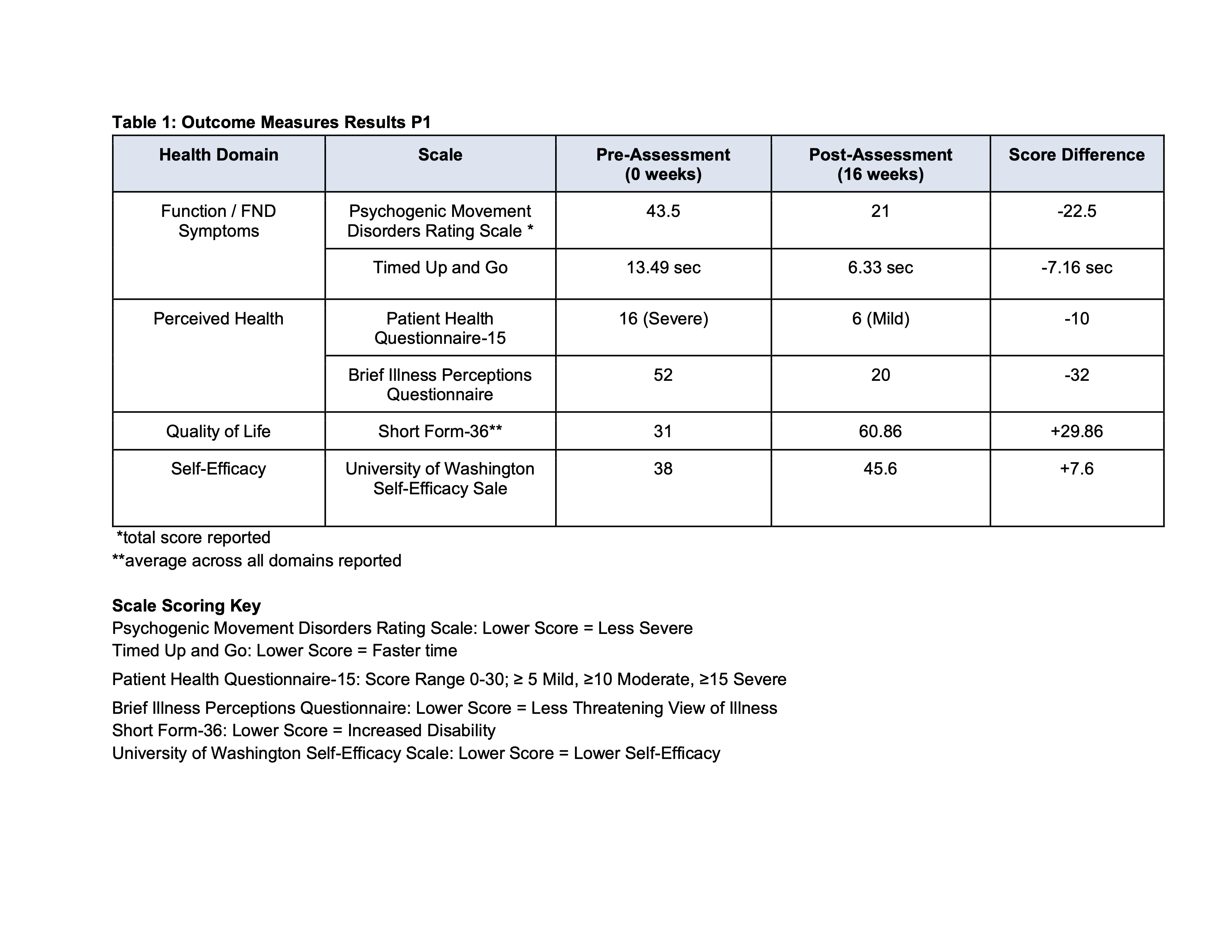Objective: To describe key components of a yoga program for an individual with FND and evaluate feasibility and efficacy.
Background: FND is the second most common reason for new outpatient neurology referrals[1-3]. It is characterized by involuntary symptoms and often associated with experienced trauma, stress, or co-morbid psychiatric symptoms. Yoga has been shown to decrease anxiety, depression[4-6], stress[7,8], and painful conditions[9]. Yoga’s mind-body effects, along with preliminary research in people with neurological conditions[10-11], suggest this multi-system approach is a potentially beneficial treatment for FND. To date, no studies have evaluated the effects of yoga on FND.
Method: One woman (P1), 54, diagnosed with FND in September 2020, engaged in 45-minute, one-on-one remote yoga sessions (via Zoom), two times weekly for eight weeks starting July 2021. Her primary symptoms were muscle spasms, general pain, and double vision. Sessions were individualized, but followed a general structure: breath control, somatic awareness, seated and standing movements, balance, and relaxation. Early sessions trained longer breath through counting and matching rhythmic movement. Postures progressed from seated, to standing using a chair, to no support. Balance progressed from using support to no support. Sessions addressed how P1 felt each day, focusing on relaxation if she was symptomatic and strength if she was energized. Evaluations were at baseline, midway, and post-intervention on function/FND symptom severity, perceived health, quality of life (Q0L), and self-efficacy.
Results: Yoga sessions established breathing and movement exercises that P1 incorporated into her daily routine and used to address specific symptoms. She improved on all assessments and domains (Table 1). There were no adverse events. P1 indicated sessions helped manage pain, symptom attacks, and increase physical activity. The remote nature of the program made sessions accessible by providing comfort in the home and eliminating commuting difficulties.
Conclusion: An individualized, remote yoga program was feasible and benefited an individual with FND. Yoga decreased FND symptom severity and increased function, perceived health, QoL, and self-efficacy. While results are promising, FND varies greatly among individuals. More research is warranted to understand how different individuals with FND will respond to a yoga program.
References: 1. Stone, J., Carson, A., Duncan, R., Roberts, R., Warlow, C., Hibberd, C., Coleman, R., Cull, R., Murray, G., Pelosi, A., Cavanagh, J., Matthews, K., Goldbeck, R., Smyth, R., Walker, J., & Sharpe, M. (2010). Who is referred to neurology clinics?—The diagnoses made in 3781 new patients. Clinical Neurology and Neurosurgery, 112(9), 747–751. https://doi.org/10.1016/j.clineuro.2010.05.011
2. Nicholson, T. R., Carson, A., Edwards, M. J., Goldstein, L. H., Hallett, M., Mildon, B., Nielsen, G., Nicholson, C., Perez, D. L., Pick, S., Stone, J., and the FND-COM (Functional Neurological Disorders Core Outcome Measures) Group, Anderson, D., Asadi-Pooya, A., Aybek, S., Baslet, G., Bloem, B. R., Brown, R. J., Chalder, T., … Tinazzi, M. (2020). Outcome Measures for Functional Neurological Disorder: A Review of the Theoretical Complexities. The Journal of Neuropsychiatry and Cli
3. Gilmour, G. S., Nielsen, G., Teodoro, T., Yogarajah, M., Coebergh, J. A., Dilley, M. D., Martino, D., & Edwards, M. J. (2020). Management of functional neurological disorder. Journal of Neurology, 267(7), 2164–2172. https://doi.org/10.1007/s00415-020-09772-w
4. Shapiro, D., Cook, I. A., Davydov, D. M., Ottaviani, C., Leuchter, A. F., & Abrams, M. (2007). Yoga as a Complementary Treatment of Depression: Effects of Traits and Moods on Treatment Outcome. Evidence-Based Complementary and Alternative Medicine, 4(4), 493–502. https://doi.org/10.1093/ecam/nel114
5. Saeed, S. A., Cunningham, K., & Bloch, R. M. (2019). Depression and Anxiety Disorders: Benefits of Exercise, Yoga, and Meditation. American Family Physician, 99(10), 620–627.
6. Lavey, R., Sherman, T., Mueser, K. T., Osborne, D. D., Currier, M., & Wolfe, R. (2005). The Effects of Yoga on Mood in Psychiatric Inpatients. Psychiatric Rehabilitation Journal, 28(4), 399–402. https://doi.org/10.2975/28.2005.399.402
7. Pascoe, M. C., & Bauer, I. E. (2015). A systematic review of randomised control trials on the effects of yoga on stress measures and mood. Journal of Psychiatric Research, 68, 270–282. https://doi.org/10.1016/j.jpsychires.2015.07.013
8. Li, A. W., & Goldsmith, C.-A. W. (2012, March). The effects of yoga on anxiety and stress. Alternative Medicine Review, 17(1), 21+. Gale OneFile: Health and Medicine.
9. Wren, A. A., Wright, M. A., Carson, J. W., & Keefe, F. J. (2011). Yoga for persistent pain: New findings and directions for an ancient practice. Pain, 152(3), 477–480. https://doi.org/10.1016/j.pain.2010.11.017
10. Jin, X., Wang, L., Liu, S., Zhu, L., Loprinzi, P. D., & Fan, X. (2019). The Impact of Mind-Body Exercises on Motor Function, Depressive Symptoms, and Quality of Life in Parkinson’s Disease: A Systematic Review and Meta-Analysis. International Journal of Environmental Research and Public Health, 17(1), 31. https://doi.org/10.3390/ijerph17010031
11. Mooventhan, A., & Nivethitha, L. (2017). Evidence based effects of yoga in neurological disorders. Journal of Clinical Neuroscience, 43, 61–67. https://doi.org/10.1016/j.jocn.2017.05.012
To cite this abstract in AMA style:
D. Kipnis, K. Kwei, H. Shah, L. Quinn. Yoga for Functional Neurological Disorder (FND) – A Case Study [abstract]. Mov Disord. 2022; 37 (suppl 2). https://www.mdsabstracts.org/abstract/yoga-for-functional-neurological-disorder-fnd-a-case-study/. Accessed April 25, 2025.« Back to 2022 International Congress
MDS Abstracts - https://www.mdsabstracts.org/abstract/yoga-for-functional-neurological-disorder-fnd-a-case-study/

